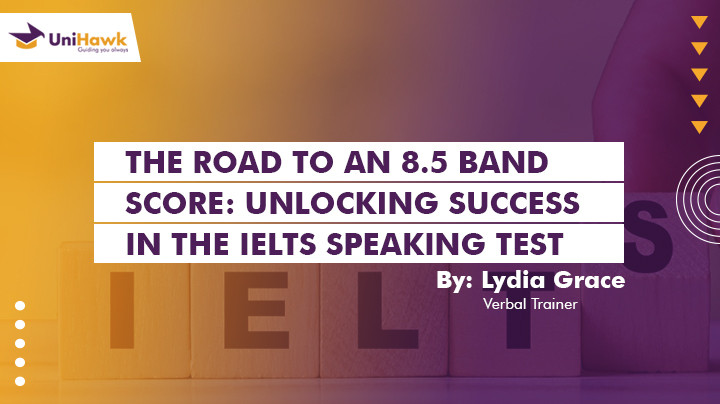One of the four skills being assessed on the IELTS, as part of your English language proficiency, is speaking. Achieving a high band score of 8.5 requires dedicated practice and preparation. Through this article, we will explore the strategies and techniques that will enable you to attain this impressive score.
1.Familiarisation with the test format
It is important to understand the format of the speaking test to excel in it. Spend some time going through the various segments in the test which includes answering personal questions, giving a short speech on a topic and a general discussion on the earlier topic with the examiner. It is crucial that the time limit for each of these parts is kept in mind. Also, to kickstart your preparation, take a speaking test just so that you know where you stand and what to expect on the test day.
2.Develop fluency and coherence
Strive for improving the fluency and coherence of your spoken English. Work on talking at length without hesitations. For instance, using many fillers in your conversation can disrupt the flow of the language. Use appropriate linking words and transitions to ensure that your ideas flow smoothly. Furthermore, practice using them in your conversation so that your thoughts are organised logically.
3.Enhance your vocabulary
Paraphrasing is a major skill that you need to develop for the speaking section. This can be done by demonstrating the broad range of vocabulary you have and also by using different sentence structures. In addition, make sure you build a robust vocabulary by reading extensively, engaging in conversations and learning the meanings of different words. Utilise techniques like flashcards and word lists to revise these words. It is essential that you make a conscious effort to incorporate them into your daily conversation to remember their usage.
4.Improve pronunciation and intonation
One of the less emphasised, yet significant aspects of your evaluation is accurate pronunciation and intonation. Focus on learning the accurate pronunciation of words using an online dictionary. Also, understand the stress patterns in the sentence and individual stress given to words to convey meaning effectively and to emphasise certain information. Additionally, practice speaking out loud and recording yourself so that you can get a better understanding of what areas you need to improve.
5.Demonstrate Grammatical accuracy
Be mindful of the tenses, verb forms and the accuracy of sentence structures in your speech. Minimise the grammatical mistakes to achieve a high band score. Also, work on studying the correct usage of tenses, identifying common mistakes and eliminating them from your conversations.
6.Learning to develop ideas and examples
To score high in your speaking, your opinions have to be supported with ideas and relevant examples. For example, for the short speech, you can brainstorm and organise your thoughts to ensure that each argument has a strong idea and example to support it.
7.Seek feedback
The key to achieving a good score is to practise regularly and get constructive feedback from a trainer. It is also important to practise speaking with peers to analyse your strengths and weaknesses. It is only through targeted practice and feedback that you can identify that specific area of improvement.
With consistent feedback, diligent preparation and effective strategies you can achieve your desired band score. Finally, with a positive mindset and confidence you can approach the test to unlock success and achieve your academic goals.
By Lydia Grace, Verbal Trainer





